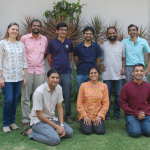Economics | Azim Premji University
The MA in Economics is a uniquely designed programme to develop the next generation of Economists with the theoretical knowledge, and technical skills to perform high quality analyses, while at the same time being grounded in the institutional, developmental and ecological context of contemporary India.
How does the programme provide content to ensure students achieve an understanding of a reasonably diverse set of perspectives on understanding economies?
Our programme has been designed to build theoretical and conceptual knowledge in several schools of thought in Economics. Students will be exposed to Neoclassical, Political Economy, Marxian, Feminist and Ecological and Institutionalist economics. The programme objective of the MA in Economics is to develop a wide range of skills—the ability to make sense of a complex social reality, a strong aptitude in dealing with abstract numbers and statistics, a sense of the historical context of societies, an understanding of human motivation and a feeling for the moral and ethical underpinnings of social arrangements. These programme goals are more fully realized when our students get exposed to diverse perspectives and approaches within Economics and our curriculum reflects this commitment.
How does the programme ensure students understand the interaction between economic and ecological systems?
We have a required course in the first year called 'Ecology and Development in India' which covers the foundational knowledge of ecological systems and the interaction of human and ecological systems in the context of contemporary India. The course exposes students to an integrated social-ecological systems theoretical framework.
How does the programme ensure students understand how to critically explore real-world evidence, both qualitative and quantitative?
We have three methods courses built into the required curriculum, 'Quantitative and Qualitative Research Methods', 'Field Practice' and 'Econometrics of Impact Evaluation'. These courses introduce students to the use of qualitative and quantiative methods and have students work with differnt types of data to analyse real world development challenges in a variety of contexts. In our 'Field Practice' course students spend three weeks in rural India conducting qualitative fieldwork on a topic of interest.
What pedagogical approaches does the programme use to ensure that students examine the historical context, assumptions and values in all economic thinking?
We employ innovative pedagogical approaches to economics including problem-based learning, flipped classrooms, collaborative learning environments and the use real economic datasets.
Azim Premji University’s unique approach is to provide students with a strong understanding of the Indian economy, economic theory, tools of analysis and the ability to practically apply these to current economic and development issues. Upon completion of our programme our goal is to have students of Economics who are socio-politically engaged, quantitatively adept and able to engage in the development sector and provide solutions for pressing problems.
How does the department ensure that the teaching culture and capacity to deliver economic pluralism are continually improving?
We are a small department of economists trained in different schools of thought who all value economic pluralism and have imbedded this in the curricular desgin of our programme and in how we engage students. The required courses cover the foundational knowledge and skills necessary to be able to understand economics from the developmental context of contemporary India. The courses cover traditional economic theory and methods, while also addressing the institutional, developmental and ecological concerns of India.
Country:
India
University:
Azim Premji University
Course name:
Economics
Department/school:
School of Development
Course level:
Taught Masters
Course language:
English

 all programmes
all programmes